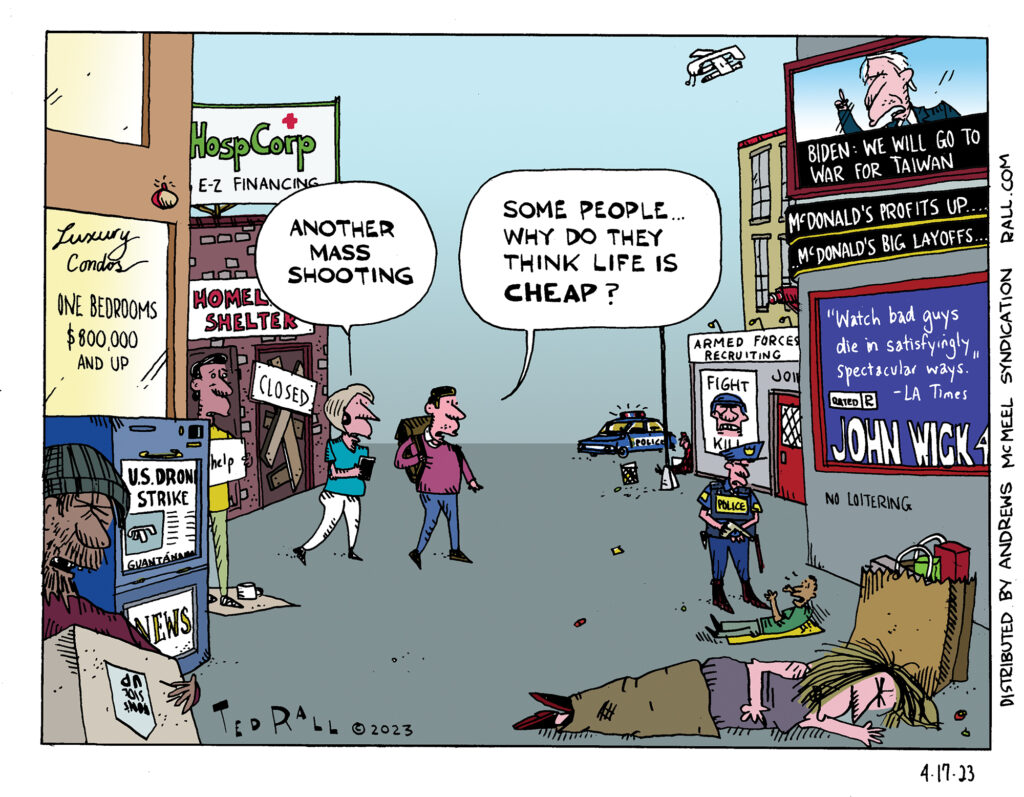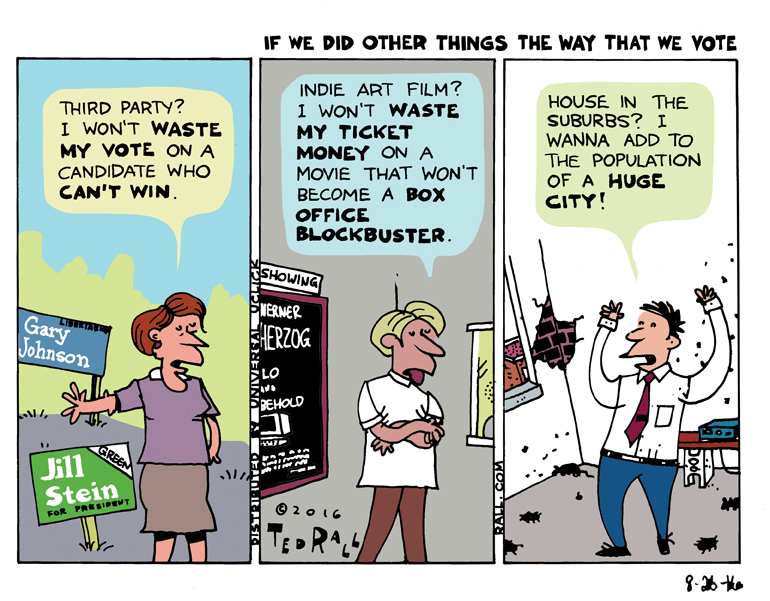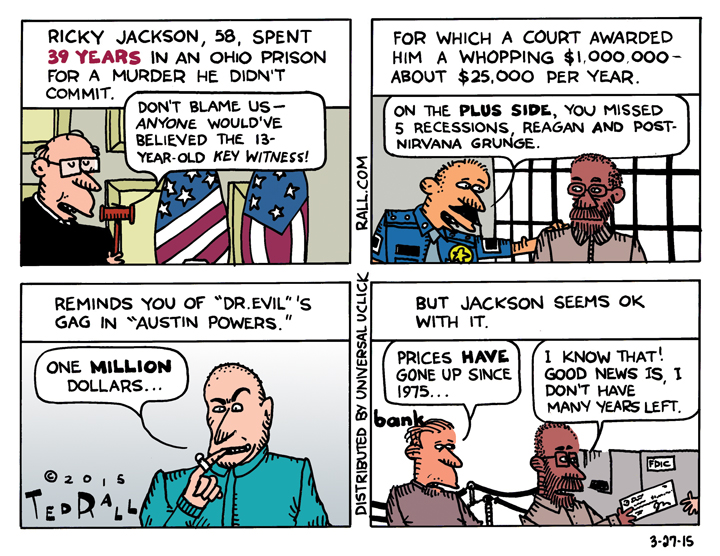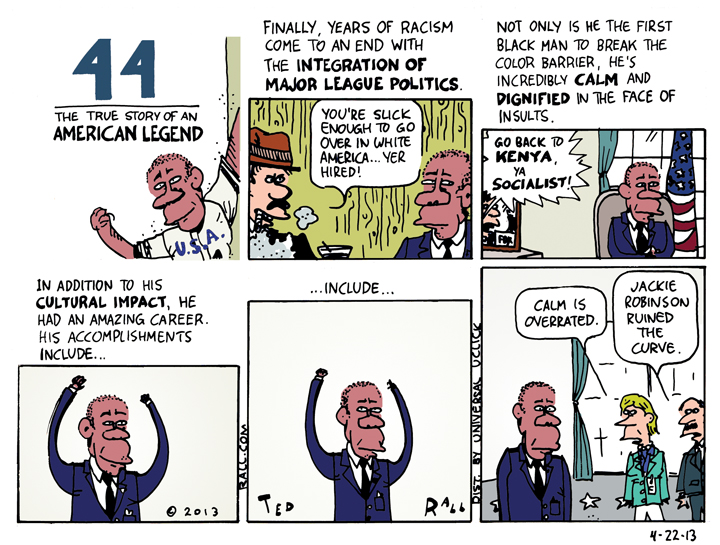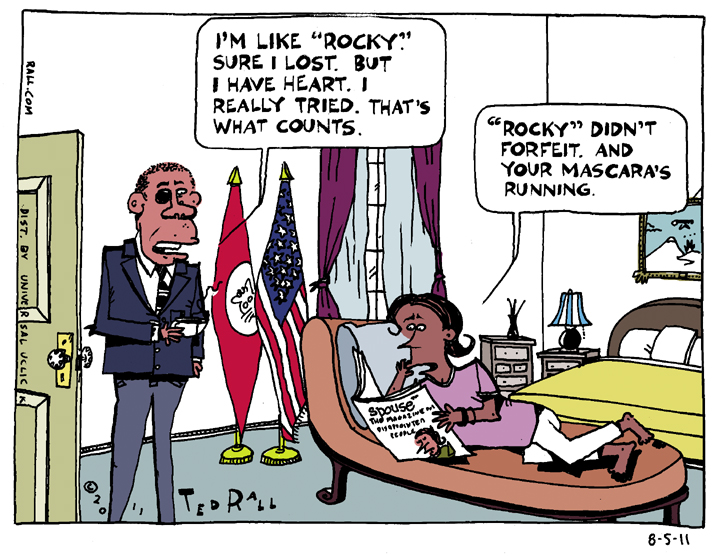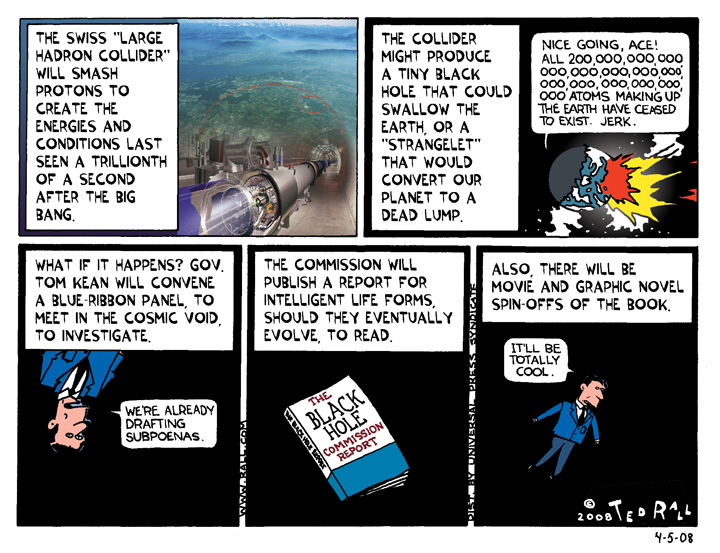A 23-year-old man was the latest mass shooter to make the headlines, this time at a bank in Louisville, Kentucky, where he was an employee. As usual, Democrats called for increased gun control. Republicans blamed the mental health crisis. Both parties have a point. But we also shouldn’t ignore something unique to America, a brutal culture of violence that permeates our politics, pop culture and our everyday lives.
SYNDICATED COLUMN: No Way Would Today’s Newspapers Publish the Pentagon Papers

Steven Spielberg’s new movie “The Post” depicts a newspaper’s decision to defy the government, risk its financial health and imprisonment of its editors in order to report a hard truth and defend the press’ First Amendment rights by publishing the Pentagon Papers.
After the Washington Post’s decision to inform the American people that top government officials had known that the Vietnam War was unwinnable yet had repeatedly lied about it for years, editor Ben Bradlee (played by Tom Hanks) dumps a pile of out-of-town newspapers on a desk for publisher Katharine Graham (Meryl Streep) to see. We’ve started a “rebellion,” Bradlee informs Graham. We’re no longer alone speaking truth to power.
No way would that happen today.
I was pleased to see that “The Post” highlights the pressures and biases that weighed against publication: a publisher undermined by sexism and low expectations, a paper trying to raise capital under the eye of nervous bankers, the Nixon Administration’s take-no-prisoners prosecutorial abuse by a vicious attorney general, and — not least — the Post’s cozy establishmentarianism, centered around Graham’s famous hard-drinking salons where reporters hobnobbed with the officials they were supposed to cover objectively.
After a lot of wavering and gnashing of lawyerly teeth, Graham finally makes the call: go to press.
The key point of this story, which isn’t made in the movie and few younger moviegoers are likely to be aware, is that it was her decision to make. The Graham family held controlling interest in the Washington Post Company. Great newspaper families like the Grahams, the Chandlers and the Sulzbergers were quirky and often had bad politics. But they also had something today’s corporate, publicly-traded media outlets do not: editorial freedom.
They didn’t always do the right thing. But they could. So sometimes they did.
Sadly, those days are gone.
Amazon CEO Jeff Bezos, reportedly a right-leaning libertarian, bought the Post in late 2013. What reception would a Daniel Ellsberg (who leaked the Pentagon Papers) or an Edward Snowden get if they contacted a Post reporter today, under Bezos?
Snowden’s case is indicative. The Post and three other papers published Snowden’s NSA leaks in 2013, months before Bezos took over. In 2016, the Bezos-owned Post called upon President Obama to refuse Snowden’s pardon application. In so doing, wrote Glenn Greenwald, the Post “achieved an ignominious feat in U.S. media history: the first-ever paper to explicitly editorialize for the criminal prosecution of its own source — one on whose back the paper won and eagerly accepted a Pulitzer Prize for Public Service.” (The other three papers were pro-pardon.)
Even more obnoxiously, the Post’s Snowden editorial didn’t mention its major conflict of interest related to intelligence agencies like the NSA. Amazon — the Post’s sister company under Bezos — had the CIA (where Snowden also worked) as a $600 million client. That’s more than twice what Bezos paid for the Post.
Coincidence? Je pense que non.
The Los Angeles Times sells “Speaking Truth to Power” hoodies. But when the power is the LAPD — and the LAPD owns the paper — the Times publishes lies.
My regular readers are familiar with the sordid details of my 2015 firing by The Los Angeles Times as a favor to LAPD Chief Charlie Beck. You’re not much of a political cartoonist in L.A. if you don’t go after the militarized, racist, violent LAPD — and the Times published many of my anti-LAPD/anti-Beck toons over the years. So did the Pasadena Weekly, which drove the boys in blue so nuts that they asked its publisher to fire me. PW refused.
Then the Times’ corporate parent, the Chicago-based Tribune Publishing, hired an LAPD-connected billionaire and wannabe politician, Austin Beutner, as publisher for the Times. Beutner appears to have midwifed a deal in which the LAPD patrolmen’s $16.4 billion union retirement fund moved to a firm that invested eight figures into a fund containing Tribune stock. (Given that newspaper stocks in general and Tribune specifically had been losing value, it’s a fair assumption that the buy was more about influence than taking care of retired LAPD officers.) Within weeks — and explicitly against Times rules — the same union issued an award to Beutner for his “support [of] the LAPD in all that they do.”
Beck asked his friend Beutner to use ginned-up “evidence” to fire and smear me; Beutner, the cop-award winner, complied, and even stayed the course after the truth came out and I was vindicated. My defamation case against Beutner and the Times is in court.
The Times never disclosed to its readers about Tribune’s business relationship with the LAPD union.
It’s a level of corruption that would make Al Capone blush. Yet it’s perfectly legal in the United States for a police union to buy a newspaper. Indeed, the same union bought part of the San Diego Union-Tribune in 2009 — and leveraged its ownership to ask that the U-T fire critics of the police.
Come to think of it, isn’t it weird that a company with more than half a billion dollars in business with the CIA is allowed to own a major news organization like the Post?
Given the Trump Administration’s attacks against “fake news” and the news media, it may seem paradoxical to suggest government action as a solution to the corruption of the news media as we’re seeing at outlets like the Washington Post and Los Angeles Times. But the evidence is clear. Outrageous deals such as those between the Post’s owner and the CIA and between the Times’ owner and the LAPD amount to government censorship of the news media — a violation of the First Amendment’s fundamental principle.
Congress should prohibit such arrangements.
(Ted Rall’s (Twitter: @tedrall) brand-new book is “Meet the Deplorables: Infiltrating Trump America,” co-written with Harmon Leon. His next book will be “Francis: The People’s Pope,” the latest in his series of graphic novel-format biographies. Publication date is March 13, 2018. You can support Ted’s hard-hitting political cartoons and columns and see his work first by sponsoring his work on Patreon.)
SYNDICATED COLUMN: “Selma” and Hollywood’s Sleazy Perversion of History
Movies are the historical record.
Americans experience the Vietnam War by watching “Apocalypse Now,” slavery in “12 Years a Slave,” and D-Day through “Saving Private Ryan.” A lot more Americans watch historical movies than read history books. Which, when done well, is not a bad thing. I’ve read countless books about the collapse of Nazi Germany, but the brilliantly-acted and directed reenactment of Hitler’s last days in his Berlin bunker depicted in the masterful 2004 German film “Downfall” can’t be beat.
When a film purports to depict a historical event, it becomes the only version of what most people believe really happened. So, as we move further into a post-literate society, misleading historical filmmaking isn’t just a waste of 2-1/2 hours.
It’s a crime against the truth.
The Ava DuVernay-directed film “Selma” is at the center of controversy, both due to its semi-snubbing by the Oscars – viewed as backtracking from last year’s relatively racially diverse choice of nominees – and accusations that it plays loose with history.
Former LBJ aide and Democratic Party stalwart Joe Califano fired the first shot with a Washington Post op-ed. “Selma,” wrote Califano, “falsely portrays President Lyndon B. Johnson as being at odds with Martin Luther King Jr. and even using the FBI to discredit him, as only reluctantly behind the Voting Rights Act of 1965 and as opposed to the Selma march itself.”
He’s right.
Robert Caro’s magisterial four-volume biography of Johnson portrays him as a deeply flawed man, but one whose passion to push for desegregation and an end to discrimination against blacks informed his political career throughout his life, though it wasn’t always obvious to his detractors.
It was only after JFK’s assassination brought him to power – actually, a movie portraying Kennedy as reluctant to support civil rights would have been accurate – that he had the chance to push through both the Civil Rights Act of 1964 and the Voting Rights Act of 1965, which he did aggressively and quickly, despite what he famously predicted would be the loss of the South to the Democratic Party for a generation or more.
Johnson gave J. Edgar Hoover’s FBI too much latitude, which Hoover used to harass King, but there’s no evidence that, as the movie depicts, it was LBJ who ordered Hoover to send audiotapes of King having sex with other women to his wife. And let’s be clear: every important conversation in the Oval Office was being taped. We have the transcripts. We would know if that had happened.
Califano takes his defense of his former boss too far when he says “[the march on] Selma was LBJ’s idea.” Otherwise, the facts are on his side: the LBJ in “Selma” is not the LBJ King knew.
Fans of the film argue that it doesn’t matter.
“Did ‘Selma’ cut some corners and perhaps tilt characters to suit the needs of the story? Why yes — just like almost every other Hollywood biopic and historical film that has been made,” the media writer David Carr writes in The New York Times.
Yes, in a movie the story is the thing. It’s hard to imagine “The Queen” — about the inner workings of the British monarchy and its relationship to then-Prime Minister Tony Blair in the aftermath of the death of Princess Diana — working without a lot of made-up dialogue between the principals. However, the great detail of these obviously private conversations signals to the audience that they don’t come out of a transcript, and that we must be witnessing a fictionalized account.
There comes a point, on the other hand, where so many corners get cut and so many characters get tilted that a film ceases to resemble history and enters the territory of complete fabulism and, in the case of “Selma” and LBJ, retroactive character assassination.
The clash between MLK and LBJ – King pushing, Johnson resisting – isn’t merely some extraneous detail of the script in “Selma.” It’s the main plot of the film.
It didn’t go down like that, yet thanks to this BS film, a generation of Americans will grow up thinking that it did.
Alyssa Rosenberg of The Washington Post repeatedly calls “Selma” “fiction.” As in: “film and other fiction.” To her, apparently, film is always fiction. But it’s not.
Like books, film is a medium.
Film can be nonfiction.
Film can be fiction.
“Califano’s approach,” she writes, “besides setting a [sic] odd standard for how fiction ought to work…suggests that we should check fiction for inaccuracies.”
As usual, the crux of the debate boils down to an inability to agree on definitions of terms. For those like Rosenberg who believe that everyone knows movies are just for fun, it doesn’t matter that “Schindler’s List” depicts showers at Auschwitz spraying water rather than Zyklon B — even though that never happened, and thus serves to understate one of the horrors of the Holocaust. To the all-movies-are-fiction crowd, “Zero Dark Forty” is cool despite its completely false claim that torture led to the assassination of Osama bin Laden.
“This is art; this is a movie; this is a film,” director DuVernay told PBS. “I’m not a historian. I’m not a documentarian.”
That’s sleazy. Truth is, her film is being marketed as fact, as she knew it would be. And it’s doing better because of it.
Audiences need a ratings system to separate films that purport to recount actual historical events from those like “Selma,” which are fictional tales using historical figures as hand puppets.
I suggest that the MPAA institute the following ratings:
Rated H for Historical: a film that makes a good faith effort to recount history accurately.
Rated S-H for Semi-Historical: a film that relies on devices like made-up dialogue and encounters, but whose basic plot line reflects history to the best of our knowledge.
Rated H-F for Historical Fiction: a film in which anything, including the basic plot line, can be made up out of whole cloth.
If the movies are going to lie to me, I deserve to know before shelling out my $12.50.
(Ted Rall, syndicated writer and cartoonist, is the author of the new critically-acclaimed book “After We Kill You, We Will Welcome You Back As Honored Guests: Unembedded in Afghanistan.” Subscribe to Ted Rall at Beacon.)
COPYRIGHT 2015 TED RALL, DISTRIBUTED BY CREATORS.COM
44
The Black Hole Commission
The Large Hadron Collider, some say, could destroy the world. Maybe even the universe. Now go watch some more sports.

